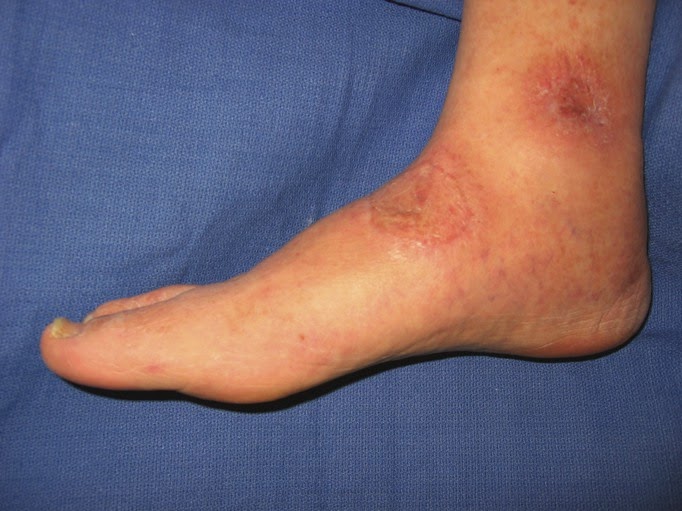Skin complications
are natural in diabetic patients. Some skin diseases related to diabetes,
such as thick & yellow skinned and diabetic dermopathy, are quite harmless,
because they don’t pose threat of infection or some serious
complications. Still, other skin problems with diabetes, such as yeast
infection and ulcers of the foot, can be unsafe if not treated
properly. People with type-2 diabetes must be cautious of all these
complications and possible preventive treatments.

Diabetics
generally develop waxy, thick skin, particularly on the fingers and upper
back. Diabetic Dermopathy develops due to abnormal metabolism of glucose which
makes skin dry, lose its elasticity and causes it to age more quickly. Also,
the skin can also have a yellowish tinge due to enormous glucose
residues. In order to avoid and treat diabetic dremopathy, try to reduce the
amount of blood sugar levels.
 |
| Diabetic Dermopathy |
High levels
of glucose in the blood causes repeated urination thus results in dehydration.
Therefore, due to the lack of water skin loses its moisture and also inhibit
sweat glands. After shower or a bath, always use a mild soap or use
moisturizer for your skin. However, there are some parts which must be
kept dry because of their sensitivity to yeast or bacterial
infections. These parts include groin, toes and armpits. Current data suggest that approximately 33%
of people with diabetes develop some form of skin disease.

Diabetics
are sensitive to all kinds of skin infection, in which yeast infection is the most
common. Whereas in vaginal area and mouth, yeast infections develop a
white curd like appearance. Control in blood sugar levels is the key to
avoid yeast infection. Also, try to keep proper personal
hygiene. Keep the whole body dry and clean. If you’ve a yeast
infection, immediately visit your nearest doctor or apply topical anti-fungal medicines
like clotrimazole or nystatin.

Diabetic
dermopathy are very common skin complication in diabetic people of older age,
especially men. People having diabetic dermopathy generally have small
brown patches on the shins, sometimes with stairs to the top. Trauma
neuropathy and glucose levels on collagen is believed to cause this skin
condition. Although this skin complication can make you suffer for many
years, but it is innocuous because it does not develop into ulcers and other severe
skin infections. The only best way to avoid this situation is to control
blood sugar level, live a healthy lifestyle and eat a balanced diet.
Reference –